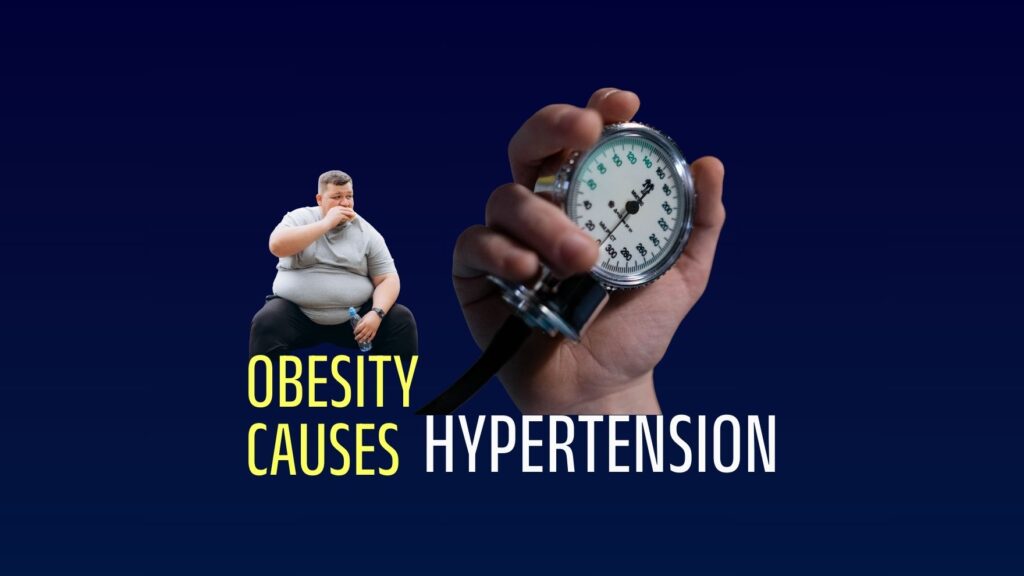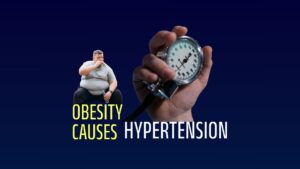
Jabeen
Bariatric Dietician & Content Writer

How Obesity Causes Hypertension?

Obesity is a widespread health issue that affects individuals of all ages across the globe. It is characterized by an excessive accumulation of body fat, leading to various health complications. One of the most concerning consequences of obesity is its strong correlation with hypertension, or high blood pressure. In this blog post, we will delve into the connection between obesity and hypertension, exploring how obesity serves as a significant risk factor for the development of hypertension.
The Role of Body Mass Index (BMI) in Obesity:
Body Mass Index (BMI) is a common measure used to determine if an individual is underweight, normal weight, overweight, or obese. Obesity is typically defined as having a BMI of 30 or higher. Excess body weight, especially abdominal obesity where fat is stored around the waist, increases the risk of developing hypertension.
Understanding Hypertension:
Hypertension is a condition characterized by consistently elevated blood pressure levels, which can put a strain on the heart and blood vessels over time. The two main types of hypertension are primary (essential) hypertension and secondary hypertension. Primary hypertension has no identifiable cause, while secondary hypertension is linked to underlying conditions such as obesity, kidney disease, or hormonal disorders.
The Link Between Obesity and Hypertension:
Obesity and hypertension are strongly interconnected, with excess body weight playing a pivotal role in the development of high blood pressure. The mechanisms by which obesity contributes to hypertension include:
Increased Circulating Blood Volume: Adipose tissue, or body fat, secretes various hormones and inflammatory factors that can disrupt the body’s fluid balance and lead to an increase in blood volume, ultimately raising blood pressure.
Insulin Resistance: Obesity-induced insulin resistance can lead to higher levels of insulin in the blood, triggering the kidneys to retain sodium and fluid, further elevating blood pressure.
Activation of the Sympathetic Nervous System: Obesity enhances the activity of the sympathetic nervous system, which regulates blood pressure and heart rate. This heightened activation can result in the constriction of blood vessels and a subsequent rise in blood pressure.
Treatment and Management:
Addressing obesity is crucial in managing hypertension and reducing the risk of associated complications. Lifestyle modifications, including adopting a healthy diet rich in fruits, vegetables, and whole grains, engaging in regular physical activity, and maintaining a healthy weight, can help improve blood pressure levels. In some cases, healthcare providers may recommend medications to control hypertension. However, focusing on long-term lifestyle changes is essential for sustainable blood pressure management.
The Impact of Obesity-Related Hypertension on Health:
The consequences of obesity-related hypertension can be severe if left unmanaged. Individuals with hypertension are at a higher risk of developing cardiovascular diseases such as heart attacks, strokes, and heart failure. Uncontrolled hypertension can also lead to damage to the arteries, kidneys, and other organs, further exacerbating health issues.
Prevention Strategies:
Prevention is key in mitigating the risks associated with obesity-related hypertension. Adopting a healthy lifestyle early on, including maintaining a balanced diet, engaging in regular physical activity, managing stress levels, and avoiding tobacco and excessive alcohol consumption, can help prevent obesity and hypertension.
Seeking Professional Guidance:
If you are concerned about your weight or blood pressure levels, it is essential to consult with a healthcare provider. They can assess your risk factors, provide personalized recommendations, and monitor your progress over time. Working collaboratively with healthcare professionals can significantly improve your chances of effectively managing obesity-related hypertension.
In conclusion, the relationship between obesity and hypertension underscores the importance of maintaining a healthy weight to support overall cardiovascular health. By understanding the mechanisms through which obesity influences blood pressure, individuals can take proactive steps to mitigate the risk of developing hypertension and its associated complications. Remember, small lifestyle changes can make a significant impact on your health journey. Prioritize your well-being and strive for a healthier, happier life.






